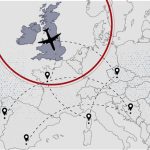A contingency plan for a flu pandemic was drawn up in 1997 that included the possible closure of schools, widespread vaccination and restricting global travel.
Doctors believed a pandemic was “imminent” and likely to come from the Far East, according to archived papers.
They show the Northern Ireland Department of Health, Social Services and Public Safety received a UK-wide Contingency Plan for Pandemic Influenza in March 1997.
It states: “The following conditions co-existing suggest that a pandemic is imminent:
“The emergence of a new strain of influenza virus which has a marked antigenic shift – a new virus; a high proportion of susceptible people in the population, ie with no immunity to the new virus either from vaccination or from previous infection with a similar virus; evidence that the new virus can spread and cause human disease.”
The document notes that new flu strains often start in Asia before spreading to Europe.
“If this occurs, some warning is likely before a new strain appears in the United Kingdom, although spread may be very rapid,” it adds.
COVID-19: Government under pressure to further reduce self-isolation period for positive cases
COVID news live: Pharmacies report ‘inconsistent supply’ of lateral flow tests – as people ask for them ‘every five minutes’
Britons facing ‘cost-of-living catastrophe’ with average household £1,200 worse off, experts warn
At the time, the first avian influenza (H5N1) cases in humans had killed a handful of people in Hong Kong but the outbreak was eventually contained after a mass cull of chickens.
And echoing the spread of coronavirus 23 years later, the contingency plan warns any flu starting in China would likely spread quickly due to “the opening of China to trade and tourism” and “increasing international movement of people and greater use of rapid methods of transportation”.
In response, Northern Ireland chief medical officer Dr Elizabeth Mitchell drafted her own plan in December 1997.
It recommended that a priority should be securing “supplies of vaccine against the new strain and to immunise as many people as possible” – especially “population groups most at risk of serious illness or death”.
The plan states that stopping the spread would be unlikely, but that it could possibly be slowed by “reducing unnecessary, especially long distance travel, and by encouraging people suffering from the disease to stay at home”.
It adds: “Closing schools is likely to cause some problems, especially for working parents, but would be an option to be considered, particularly if teacher absenteeism reached levels at which schools could not function.”
Dr Mitchell’s report also states that non-urgent hospital admissions and operations would “need to be reviewed and may need to be suspended to make beds available”.
Ultimately however, the plans were left on the shelf as the pandemic did not emerge and bird flu cases in Asia were contained.






















